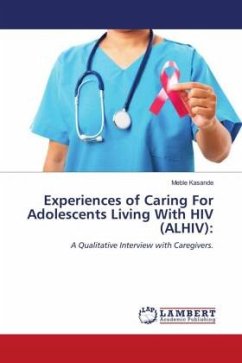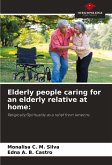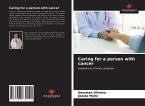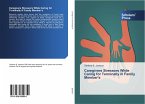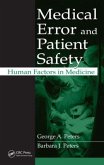Caring for Caregivers to Be
A Comprehensive Approach to Developing Well-Being Programs for the Health Care Learner
Herausgeber: Ripp, Jonathan; Thomas, Larissa R
Caring for Caregivers to Be
A Comprehensive Approach to Developing Well-Being Programs for the Health Care Learner
Herausgeber: Ripp, Jonathan; Thomas, Larissa R
- Gebundenes Buch
- Merkliste
- Auf die Merkliste
- Bewerten Bewerten
- Teilen
- Produkt teilen
- Produkterinnerung
- Produkterinnerung
Caring for Caregivers to Be provides evidence-based insights and solutions to reduce burnout and improve well-being among medical learners, particularly students and graduate medical trainees
Andere Kunden interessierten sich auch für
![Experiences of Caring For Adolescents Living With HIV (ALHIV): Experiences of Caring For Adolescents Living With HIV (ALHIV):]() Meble KasandeExperiences of Caring For Adolescents Living With HIV (ALHIV):30,99 €
Meble KasandeExperiences of Caring For Adolescents Living With HIV (ALHIV):30,99 €![Actively Caring for Safety Actively Caring for Safety]() E Scott GellerActively Caring for Safety154,99 €
E Scott GellerActively Caring for Safety154,99 €![Elderly people caring for an elderly relative at home: Elderly people caring for an elderly relative at home:]() Monalisa C. M. SilvaElderly people caring for an elderly relative at home:44,99 €
Monalisa C. M. SilvaElderly people caring for an elderly relative at home:44,99 €![Caring for a person with cancer Caring for a person with cancer]() Dionatan OliveiraCaring for a person with cancer26,99 €
Dionatan OliveiraCaring for a person with cancer26,99 €![Caregivers Stressors While Caring for Terminally ill Family Member's Caregivers Stressors While Caring for Terminally ill Family Member's]() Darlene B. JacksonCaregivers Stressors While Caring for Terminally ill Family Member's52,99 €
Darlene B. JacksonCaregivers Stressors While Caring for Terminally ill Family Member's52,99 €![Medical Error and Patient Safety Medical Error and Patient Safety]() George A PetersMedical Error and Patient Safety138,99 €
George A PetersMedical Error and Patient Safety138,99 €![A Definitive Guide to Behavioural Safety A Definitive Guide to Behavioural Safety]() Tim MarshA Definitive Guide to Behavioural Safety176,99 €
Tim MarshA Definitive Guide to Behavioural Safety176,99 €-
-
-
Caring for Caregivers to Be provides evidence-based insights and solutions to reduce burnout and improve well-being among medical learners, particularly students and graduate medical trainees
Hinweis: Dieser Artikel kann nur an eine deutsche Lieferadresse ausgeliefert werden.
Hinweis: Dieser Artikel kann nur an eine deutsche Lieferadresse ausgeliefert werden.
Produktdetails
- Produktdetails
- Verlag: Hurst & Co.
- Seitenzahl: 400
- Erscheinungstermin: 30. Mai 2023
- Englisch
- Abmessung: 257mm x 184mm x 26mm
- Gewicht: 857g
- ISBN-13: 9780197658185
- ISBN-10: 0197658180
- Artikelnr.: 67732708
- Herstellerkennzeichnung
- Libri GmbH
- Europaallee 1
- 36244 Bad Hersfeld
- gpsr@libri.de
- Verlag: Hurst & Co.
- Seitenzahl: 400
- Erscheinungstermin: 30. Mai 2023
- Englisch
- Abmessung: 257mm x 184mm x 26mm
- Gewicht: 857g
- ISBN-13: 9780197658185
- ISBN-10: 0197658180
- Artikelnr.: 67732708
- Herstellerkennzeichnung
- Libri GmbH
- Europaallee 1
- 36244 Bad Hersfeld
- gpsr@libri.de
Jonathan Ripp, MD, MPH, is Professor of Medicine, Medical Education, and Geriatrics and Palliative Medicine at the Icahn School of Medicine at Mount Sinai in New York City, where he is also Chief Wellness Officer and Dean for Well-Being and Resilience. Dr. Ripp oversees efforts to assess and provide direction for system- and individual-level interventions designed to improve well-being for all students, residents, fellows, faculty, and other health professionals in the Mount Sinai Health System. He is also Co-Founder and Co-Director of CHARM, the Collaborative for Healing and Renewal in Medicine, a professional network for well-being leaders. Dr. Ripp's primary research interest is in physician burnout and well-being, for which he has received grant support and has published and lectured widely. Larissa R. Thomas is Professor of Medicine and the Director of Well-Being for Graduate Medical Education at the University of California, San Francisco. She is also a faculty hospitalist at Zuckerberg Francisco General Hospital and a member of the UCSF Academy of Medical Educators, for which she is the Endowed Chair for the Scholarship of Teaching and Learning. Dr. Thomas is a member of the steering committee and Director of the GME Well-Being Leaders Network for the Collaborative for Healing and Renewal in Medicine (CHARM), a national working group to establish best practice recommendations and consensus guidelines for physician well-being. Her interests include medical education and development of physician well-being initiatives, and she has received several grants to explore organizational innovations to improve well-being. Dennis S. Charney, MD, is Anne and Joel Ehrenkranz Dean of the Icahn School of Medicine at Mount Sinai and President for Academic Affairs for the Mount Sinai Health System.
* Contributors
* Foreword
* Dennis Charney
* Introduction
* Jonathan Ripp
* Section I: The Scope of Medical Student and Trainee Burnout
* Chapter 1: Models of Well-Being: Developing a Conceptual Framework
* Larissa R. Thomas
* Chapter 2: On Measurement and Semantics: Metrics and Terminology
* Colin West and Jordyn Feingold
* Chapter 3: Taking the Pulse: Prevalence of Burnout
* Jordyn Feingold and Carly Kaplan
* Chapter 4: What's Causing the Problem?: Drivers of Well-Being
* Susan M. Orrange, Michael S. Adragna, and Ashley Jeanlus
* Chapter 5: What's at Stake?: Consequences of Burnout
* Ingrid Philibert and Lyuba Konopasek
* Section II: Design Consideration for a Comprehensive Well-Being
Program
* Chapter 6: Components of a Comprehensive Well-Being Program
* Jennifer G. Duncan, Michael Maguire, and Stuart J. Slavin
* Chapter 7: Individually Focused Well-Being Interventions
* Farah Hussain, Mary Elizabeth Yaden, and Oana Tomescu
* Chapter 8: System-Level Interventions
* Mariah A. Quinn and Kerri Palamara
* Chapter 9: Raising Awareness and Ensuring Access to Mental Health
Resources
* Carol A. Bernstein, Claire Haiman, and Laurel E. S. Mayer
* Chapter 10: Addressing and Meeting Regulatory Requirements
* Tara K. Cunningham and Michael Leitman
* Section III: Bringing It Home and Making the Case
* Chapter 11: Diagnosing Your Institution's Readiness to Address
Trainee Well-Being
* Larissa R. Thomas, Irina Kryzhanovskaya, and Saadia Akhtar
* Chapter 12: Making the Case for Institutional Commitment to
Well-Being
* Elizabeth Harry and Elizabeth Lawrence
* Chapter 13: Preparing Your Pitch: Communications and Organizational
Approaches
* Paul Chelminski and Mukta Panda
* Chapter 14: Initial Steps in Program Development
* Saadia Akhtar, Sakshi Dua, Paul Rosenfield, and Jonathan Ripp
* Section IV: Final Considerations
* Chapter 15: Novel Technology and Discoveries: The Future of Physician
Well-Being
* Keith A. Horvath and Anne J. Berry
* Chapter 16: Institutional Responses and the Role of the Chief
Wellness Officer
* Jonathan Ripp, Sharon Kiely, and Amy Frieman
* Chapter 17: Advocating for Physician Well-Being at the Societal Level
* Christine A. Sinsky and Alexandra M. Ristow
* Chapter 18: Attending to Medical Student and GME Trainee Well-Being
in the Midst of Crisis: The Example of the COVID-19 Pandemic
* Jonathan DePierro, Lauren Peccoralo, Alicia Hurtado, Saadia Akhtar,
and Jonathan Ripp
* Index
* Foreword
* Dennis Charney
* Introduction
* Jonathan Ripp
* Section I: The Scope of Medical Student and Trainee Burnout
* Chapter 1: Models of Well-Being: Developing a Conceptual Framework
* Larissa R. Thomas
* Chapter 2: On Measurement and Semantics: Metrics and Terminology
* Colin West and Jordyn Feingold
* Chapter 3: Taking the Pulse: Prevalence of Burnout
* Jordyn Feingold and Carly Kaplan
* Chapter 4: What's Causing the Problem?: Drivers of Well-Being
* Susan M. Orrange, Michael S. Adragna, and Ashley Jeanlus
* Chapter 5: What's at Stake?: Consequences of Burnout
* Ingrid Philibert and Lyuba Konopasek
* Section II: Design Consideration for a Comprehensive Well-Being
Program
* Chapter 6: Components of a Comprehensive Well-Being Program
* Jennifer G. Duncan, Michael Maguire, and Stuart J. Slavin
* Chapter 7: Individually Focused Well-Being Interventions
* Farah Hussain, Mary Elizabeth Yaden, and Oana Tomescu
* Chapter 8: System-Level Interventions
* Mariah A. Quinn and Kerri Palamara
* Chapter 9: Raising Awareness and Ensuring Access to Mental Health
Resources
* Carol A. Bernstein, Claire Haiman, and Laurel E. S. Mayer
* Chapter 10: Addressing and Meeting Regulatory Requirements
* Tara K. Cunningham and Michael Leitman
* Section III: Bringing It Home and Making the Case
* Chapter 11: Diagnosing Your Institution's Readiness to Address
Trainee Well-Being
* Larissa R. Thomas, Irina Kryzhanovskaya, and Saadia Akhtar
* Chapter 12: Making the Case for Institutional Commitment to
Well-Being
* Elizabeth Harry and Elizabeth Lawrence
* Chapter 13: Preparing Your Pitch: Communications and Organizational
Approaches
* Paul Chelminski and Mukta Panda
* Chapter 14: Initial Steps in Program Development
* Saadia Akhtar, Sakshi Dua, Paul Rosenfield, and Jonathan Ripp
* Section IV: Final Considerations
* Chapter 15: Novel Technology and Discoveries: The Future of Physician
Well-Being
* Keith A. Horvath and Anne J. Berry
* Chapter 16: Institutional Responses and the Role of the Chief
Wellness Officer
* Jonathan Ripp, Sharon Kiely, and Amy Frieman
* Chapter 17: Advocating for Physician Well-Being at the Societal Level
* Christine A. Sinsky and Alexandra M. Ristow
* Chapter 18: Attending to Medical Student and GME Trainee Well-Being
in the Midst of Crisis: The Example of the COVID-19 Pandemic
* Jonathan DePierro, Lauren Peccoralo, Alicia Hurtado, Saadia Akhtar,
and Jonathan Ripp
* Index
* Contributors
* Foreword
* Dennis Charney
* Introduction
* Jonathan Ripp
* Section I: The Scope of Medical Student and Trainee Burnout
* Chapter 1: Models of Well-Being: Developing a Conceptual Framework
* Larissa R. Thomas
* Chapter 2: On Measurement and Semantics: Metrics and Terminology
* Colin West and Jordyn Feingold
* Chapter 3: Taking the Pulse: Prevalence of Burnout
* Jordyn Feingold and Carly Kaplan
* Chapter 4: What's Causing the Problem?: Drivers of Well-Being
* Susan M. Orrange, Michael S. Adragna, and Ashley Jeanlus
* Chapter 5: What's at Stake?: Consequences of Burnout
* Ingrid Philibert and Lyuba Konopasek
* Section II: Design Consideration for a Comprehensive Well-Being
Program
* Chapter 6: Components of a Comprehensive Well-Being Program
* Jennifer G. Duncan, Michael Maguire, and Stuart J. Slavin
* Chapter 7: Individually Focused Well-Being Interventions
* Farah Hussain, Mary Elizabeth Yaden, and Oana Tomescu
* Chapter 8: System-Level Interventions
* Mariah A. Quinn and Kerri Palamara
* Chapter 9: Raising Awareness and Ensuring Access to Mental Health
Resources
* Carol A. Bernstein, Claire Haiman, and Laurel E. S. Mayer
* Chapter 10: Addressing and Meeting Regulatory Requirements
* Tara K. Cunningham and Michael Leitman
* Section III: Bringing It Home and Making the Case
* Chapter 11: Diagnosing Your Institution's Readiness to Address
Trainee Well-Being
* Larissa R. Thomas, Irina Kryzhanovskaya, and Saadia Akhtar
* Chapter 12: Making the Case for Institutional Commitment to
Well-Being
* Elizabeth Harry and Elizabeth Lawrence
* Chapter 13: Preparing Your Pitch: Communications and Organizational
Approaches
* Paul Chelminski and Mukta Panda
* Chapter 14: Initial Steps in Program Development
* Saadia Akhtar, Sakshi Dua, Paul Rosenfield, and Jonathan Ripp
* Section IV: Final Considerations
* Chapter 15: Novel Technology and Discoveries: The Future of Physician
Well-Being
* Keith A. Horvath and Anne J. Berry
* Chapter 16: Institutional Responses and the Role of the Chief
Wellness Officer
* Jonathan Ripp, Sharon Kiely, and Amy Frieman
* Chapter 17: Advocating for Physician Well-Being at the Societal Level
* Christine A. Sinsky and Alexandra M. Ristow
* Chapter 18: Attending to Medical Student and GME Trainee Well-Being
in the Midst of Crisis: The Example of the COVID-19 Pandemic
* Jonathan DePierro, Lauren Peccoralo, Alicia Hurtado, Saadia Akhtar,
and Jonathan Ripp
* Index
* Foreword
* Dennis Charney
* Introduction
* Jonathan Ripp
* Section I: The Scope of Medical Student and Trainee Burnout
* Chapter 1: Models of Well-Being: Developing a Conceptual Framework
* Larissa R. Thomas
* Chapter 2: On Measurement and Semantics: Metrics and Terminology
* Colin West and Jordyn Feingold
* Chapter 3: Taking the Pulse: Prevalence of Burnout
* Jordyn Feingold and Carly Kaplan
* Chapter 4: What's Causing the Problem?: Drivers of Well-Being
* Susan M. Orrange, Michael S. Adragna, and Ashley Jeanlus
* Chapter 5: What's at Stake?: Consequences of Burnout
* Ingrid Philibert and Lyuba Konopasek
* Section II: Design Consideration for a Comprehensive Well-Being
Program
* Chapter 6: Components of a Comprehensive Well-Being Program
* Jennifer G. Duncan, Michael Maguire, and Stuart J. Slavin
* Chapter 7: Individually Focused Well-Being Interventions
* Farah Hussain, Mary Elizabeth Yaden, and Oana Tomescu
* Chapter 8: System-Level Interventions
* Mariah A. Quinn and Kerri Palamara
* Chapter 9: Raising Awareness and Ensuring Access to Mental Health
Resources
* Carol A. Bernstein, Claire Haiman, and Laurel E. S. Mayer
* Chapter 10: Addressing and Meeting Regulatory Requirements
* Tara K. Cunningham and Michael Leitman
* Section III: Bringing It Home and Making the Case
* Chapter 11: Diagnosing Your Institution's Readiness to Address
Trainee Well-Being
* Larissa R. Thomas, Irina Kryzhanovskaya, and Saadia Akhtar
* Chapter 12: Making the Case for Institutional Commitment to
Well-Being
* Elizabeth Harry and Elizabeth Lawrence
* Chapter 13: Preparing Your Pitch: Communications and Organizational
Approaches
* Paul Chelminski and Mukta Panda
* Chapter 14: Initial Steps in Program Development
* Saadia Akhtar, Sakshi Dua, Paul Rosenfield, and Jonathan Ripp
* Section IV: Final Considerations
* Chapter 15: Novel Technology and Discoveries: The Future of Physician
Well-Being
* Keith A. Horvath and Anne J. Berry
* Chapter 16: Institutional Responses and the Role of the Chief
Wellness Officer
* Jonathan Ripp, Sharon Kiely, and Amy Frieman
* Chapter 17: Advocating for Physician Well-Being at the Societal Level
* Christine A. Sinsky and Alexandra M. Ristow
* Chapter 18: Attending to Medical Student and GME Trainee Well-Being
in the Midst of Crisis: The Example of the COVID-19 Pandemic
* Jonathan DePierro, Lauren Peccoralo, Alicia Hurtado, Saadia Akhtar,
and Jonathan Ripp
* Index


